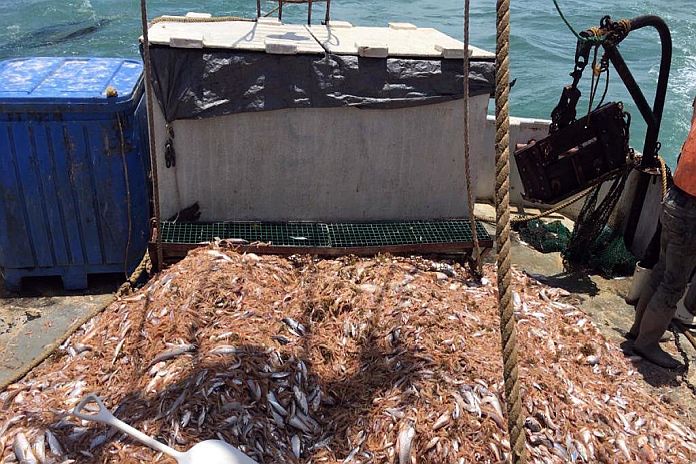By Indranie Deolall
I have a precious but dwindling jar of dried Guyanese salted seabob that I save to use sparingly in my cooking.
Brought by generous relatives when they visited pre-COVID-19 lockdown, it came in a wrapped batch of vital national supplies including my favourite fried grey snapper in fat, seasoned, juicy chunks that quickly disappeared; complementary pickled fiery-red balls of the fine-flavoured wiri wiri peppers that lasted only a little longer and of course the indigenous compulsory Christmas classic, concentrated cassareep from the North West district, that I have still hidden in the darkest depths of my kitchen cupboard.
Largest seabob producer
Guyana is the world’s largest producer of the delicious Atlantic shrimp, a commercially important golden brown decapod crustacean that is caught in marine and brackish waters off the continental coast of the United States, all the way down to the rich shorelines of South America. Our annual harvest of some 20 000 tonnes of the fast-growing shrimp is worth an estimated US$50M, making it this country’s most valuable seafood export and among the top economic contributors according to the figures from the Food and Agricultural Organization (FAO) of the United Nations.
I knew it as “coarse shrimp” in reference to its size and we would buy it, not frozen in a grey, anonymous slab from supermarkets but fresh and firm in scattered, steaming heaps from the fish vendors in our famous coastal markets. I would race to finish “cleaning” the shrimp for a fragrant “bhonjal” or dry curry; or an evening meal sautéed Asian style with ginger, garlic and chillies, or to flavour a simmering pot of “cook-up rice.” After all, Guyanese love their seafood and it remains a cheap, ready source of protein. Most of the industrial catch is processed into frozen, peeled shrimp while bycatch yields such as the tiny but sweet white belly shrimp, are sold here and used as-is or sun-dried and wood-smoked. Seabob shrimp are a fast growing species with a typical lifespan of 18 months. The Guyana seabob is caught by bottom and shrimp trawls.
MSC certification
It was only last year that the respected London-based Marine Stewardship Council (MSC), an independent non-profit organisation that sets standards for sustainable fishing, formally certified the local fishery of the bottom-dwelling shrimp with the giant name “Xiphopenaeus kroyeri,” in the Western Central Atlantic. The expert assessment was requested by the Guyana Association of Trawler Owners and Seafood Processors (GATOSP) in 2018 following a Fisheries Improvement Project started in 2012.
Forced to adjust to the changing requirements of environmentally-conscious consumers in key international markets, the Association recognised the growing importance of the distinctive blue MSC ecolabel which marks all seafood products from vetted supply chains. There are now thousands of items available with the stamp, sold in at least 100 countries around the world.
A week ago, the MSC called for urgent international action to protect Atlanto-Scandian herring and blue whiting after eight fisheries had their MSC certification suspended effective this month-end. Assessors pointed to the failure of, states including within the European Union, Norway, Iceland, the Faroe Islands, and the United Kingdom, to reach quota-sharing agreements and fish within scientifically-advised limits. The Council noted the situation is being exacerbated by the shifting migration of stocks in the North-East Atlantic.
Public stink
Just four months after the People’s Progressive Party/Civic (PPP/C) finally came to office following the prolonged elections-rigging fiasco, the Guyana Association is raising a public stink over the distinctly fishy business behind the secret issuing of two new trawling licences, by the Fisheries Department within the agriculture ministry, which the group maintains could decimate the industry. Stabroek News reported that the licences were apparently given to an unnamed local firm financed by a large Chinese company.
Pointing to declines in seabob harvesting, GATOSP warned that the clandestine licensing constitutes a threat to the industry’s sustainability and that it contravenes the agreements they have with the Ministry and the MSC. The three largest processing facilities employ about 1 600 individuals, 45 percent of whom are women.

Minister at sea
However, the minister of agriculture Zulfikar Mustapha wants us to believe he is very much at sea and apparently needs time to mullet over, since he advised the newspaper that he is currently gathering all the necessary information and will make a statement shortly on the issue, while promising to meet with GATOSP soon.
A 2019 “stock assessment of Guyana’s seabob population revealed that it is healthy but fully exploited,” the FAO”s Regional Office stressed in a recent statement announcing the launching of its FISH4ACP programme to boost the competitiveness and sustainability of the sector, noting local demand is expected to rise with emerging oil and gas output. The MSC certification will help to consolidate existing markets and facilitate access to new ones, it said.
Stock sustainability
“The continued success of the seabob industry is therefore dependent on strong management of the natural resources stock for sustainability, minimisation of waste and detrimental practices, maintaining competitiveness in the global marketplace, and close collaboration and partnership by the key stakeholders. The success of each stakeholder is heavily dependent on sustainable practices by everyone one in the industry,” the FAO asserted in a related statement on its website.
It has joined forces with the Fisheries Department, the University of Guyana, and others to gather information on the main environmental, economic, and social challenges of the seabob fishery. The FISH4ACP is an initiative of the Organisation of African, Caribbean and Pacific States (OACPS), focused on 12 such fisheries and aquaculture value chains to boost economic returns and social benefits, and minimise damage to natural habitats and marine wildlife. It is implemented by the FAO with funding from the European Union and the German Federal Ministry for Economic Cooperation and Development (BMZ).
Chinese 30-vessels proposal
The May 2015-elections loss by the PPP/C to the coalition APNU+AFC put an end then, to the frightening attempts by foreigners to dominate the key industry, through a US$70 million investment proposal by a Chinese fishing company Fuzhou Hong-dong Pelagic Fishery to operate 30 deep-sea fishing vessels consisting of 120-foot trawlers and drift netters, two auxiliary boats and a storage and progressing facility on land. It has also requested a range of concessions and tax breaks.
The then minister of agriculture Dr Leslie Ramsammy had insisted no permission was granted to any such Chinese group. “No licence will be granted for open fishing. If given, it will be for specific species,” he added. All foreign licences are normally dealt with at the minister’s level.
Earlier, a Chinese firm interested in deep-sea fishing had signed a Memorandum of Understanding to conduct a study of fish species available here that are not already being harvested by local fishermen and trawler operators. Dr Ramsammy had stated, “We have made it pellucidly clear that we are not going to be giving any licences for prawns and seabob. If they include that we will not grant it.”
Resources bartered away
Prompting heavy criticism by interest groups, the reports were hammered by among others, the Guyana Human Rights Association which said the minister’s “considering licensing Chinese fishing vessels to operate in Guyana’s waters is yet another example of Guyana’s natural resources being bartered away to Chinese interests without any reference to the people most directly affected, or the environmental effects.”
With 87 licensed trawlers, and about 300 artisanal-type net vessels, already working our depleting fishing zones north of Region One, offshore Georgetown, and in the Corentyne River, established operators and processors have a right not to accept a smelly pile of carp and to be concerned that they were denied first preference to reapply since they had cut back operations by almost a third.
Tip quickly
As managing director of Gopie Investments, Raoul Gopie pointed out “the evidence shows we are a little bit overfishing but we are still sustainable” declaring in the controlled sector, “We are harvesting exactly what is being reproduced. Should something go wrong and that could tip quickly…” Just like my shrimp jar.
*ID looks across to the Galápagos Islands where a Chinese armada of 300 vessels logged 73,000 hours during just one month this year as it pulled up thousands of tonnes of squid and fish, stirring controversy and outrage in Ecuador.





